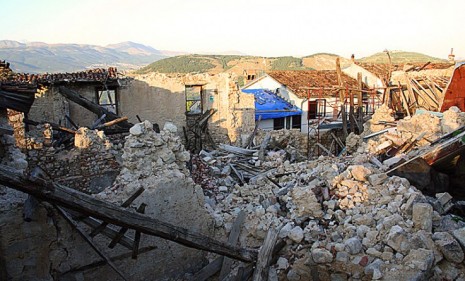Should scientists be held responsible for earthquake deaths?
In Italy, six scientists are being tried for manslaughter after failing to predict a 2009 earthquake that killed 309 people

A free daily email with the biggest news stories of the day – and the best features from TheWeek.com
You are now subscribed
Your newsletter sign-up was successful
On Tuesday, six Italian scientists and one former government official went on trial for manslaughter for failing to adequately warn the citizens of L'Aquila before a 6.3-magnitude earthquake struck on April 6, 2009. Though a series of smaller quakes preceded the fatal temblor, which razed much of the medieval city and killed 309 people, the seven defendants decided at a meeting held a week before it hit that the region was safe. The civil defense official told the public that there was "no danger." Do the scientists really have blood on their hands?
No. This is a "travesty of justice": Charging these scientists with manslaughter is a "deeply shameful" scandal, says Arab News in an editorial. Given our poor understanding of seismic activity, "there is no way that any scientist, however eminent, could have predicted the scale and date" of that earthquake. If anyone should be punished here, it's the prosecutor, or the "notoriously lax" construction industry that flouted building codes.
The Week
Escape your echo chamber. Get the facts behind the news, plus analysis from multiple perspectives.

Sign up for The Week's Free Newsletters
From our morning news briefing to a weekly Good News Newsletter, get the best of The Week delivered directly to your inbox.
From our morning news briefing to a weekly Good News Newsletter, get the best of The Week delivered directly to your inbox.
Hold on. The case has some merit: The prosecutor recognizes that predicting "exactly when, where, and with what force the earthquake would have struck" is still "beyond the bounds of science," says The Economist. But he insists that these seven defendants were negligent for failing to adequately communicate, or even understand, the risks. Local experts who have examined the same data the defendants consulted in 2009 say that "the increased danger in the run-up to the quake was clear."
And scientists shouldn't be untouchable: It seems unfair to blame seismologists for not predicting when the big one hits, says Will Harvie in New Zealand's Stuff. But scientists need to be transparent with the public so people can judge the risks for themselves. At least one survivor says that if the scientists had accurately relayed what they knew, his wife and child would be alive today. Given the lives at stake, "these officials can't have immunity from prosecution. They must be prosecutable if they fall below an acceptable standard." And it's up to the legal system to judge if that's the case here.
"Should we prosecute quake scientists?"
A free daily email with the biggest news stories of the day – and the best features from TheWeek.com
-
 Buddhist monks’ US walk for peace
Buddhist monks’ US walk for peaceUnder the Radar Crowds have turned out on the roads from California to Washington and ‘millions are finding hope in their journey’
-
 American universities are losing ground to their foreign counterparts
American universities are losing ground to their foreign counterpartsThe Explainer While Harvard is still near the top, other colleges have slipped
-
 How to navigate dating apps to find ‘the one’
How to navigate dating apps to find ‘the one’The Week Recommends Put an end to endless swiping and make real romantic connections